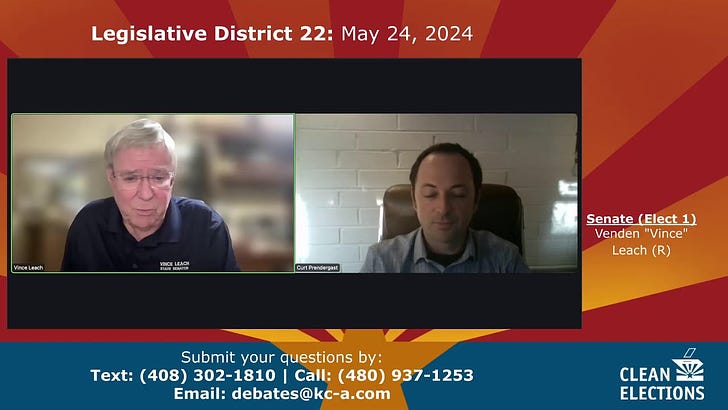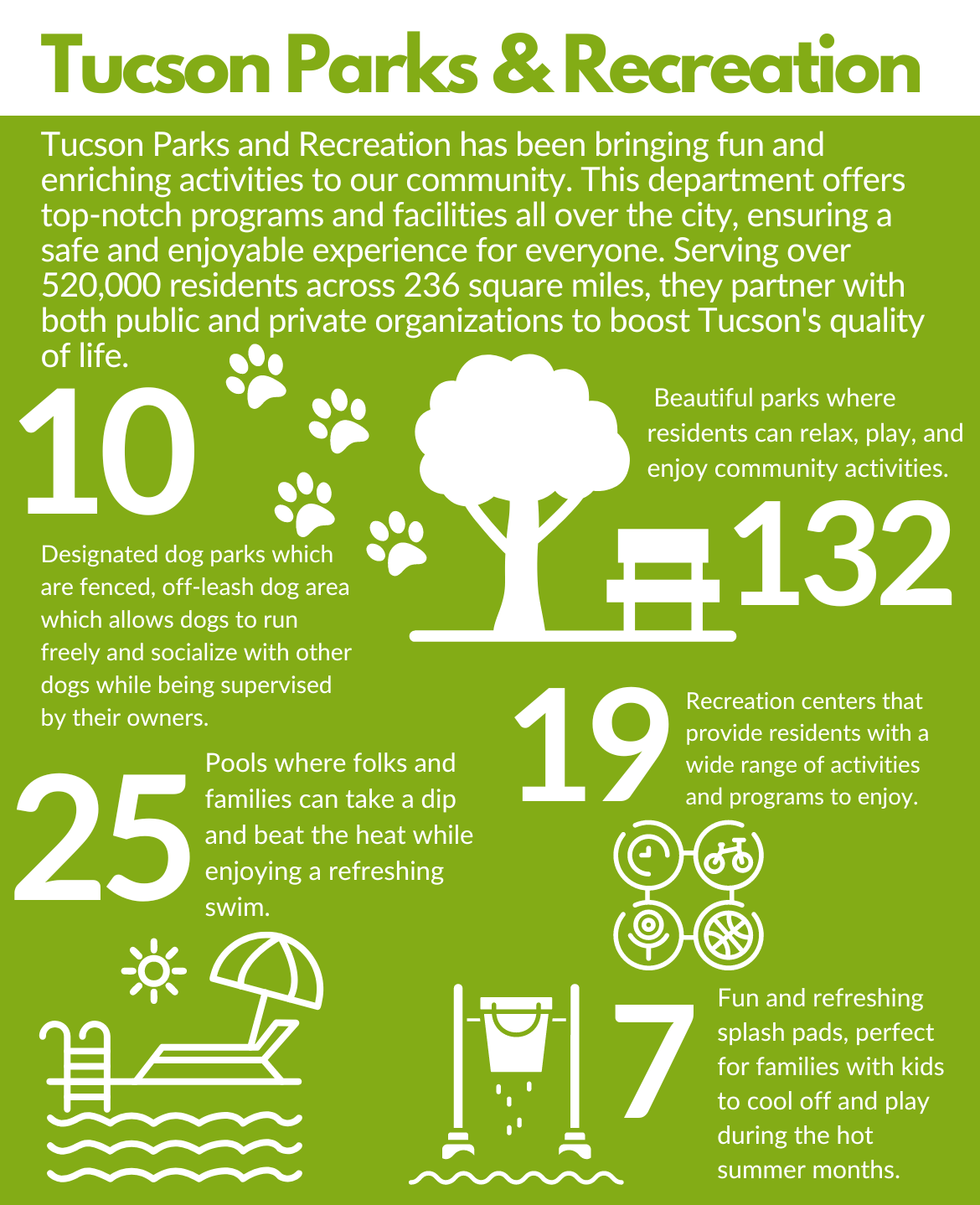The Daily Agenda: Leach says he already knows how to do the job
GOP candidate Vince Leach wants to take back the LD 17 Senate seat from Wadsack ... He says his eight years in the Legislature make him the better choice ... Roadrunners not running away.
All five Republican candidates in Legislative District 17 had the opportunity last week to persuade voters to choose them.
But the only one who showed up was Vince Leach, the former state legislator who is trying to win back the Senate seat he lost to Sen. Justine Wadsack in the 2022 primary.
So instead of a five-candidate debate for the Senate seat and two House seats, voters heard Leach’s positions on the budget deficit, immigration, water, and an array of other issues.
“Being here, in front of you, in front of the people, to have these discussions” is an important part of being a legislative candidate and sets him apart from Wadsack, Leach said.
The debate was hosted by the Citizens Clean Elections Commission and moderated by Curt. You can watch it here (it starts at the 25:25 mark). We also highlighted the main points for you.
Legislative experience: Leach bills himself as a “conservative champion” and focuses on the fiscal issues he knows well after spending years on legislative budget and finance committees from 2015 to 2023.
He says his greatest fiscal accomplishments in the Legislature were paying down the debt on the state’s pension system, passing balanced budgets, and shrinking the state government’s workforce. On social policy, it was voting for bills so “girls play girls sports and boys play boys sports.”
It’s that legislative experience that Leach says makes him a better candidate than Wadsack. He knows how the system works, how to get things done, and how to find answers and assistance for his constituents.
The budget: When he was in the Legislature, they had a $2.5 billion budget surplus, but “that’s gone” and the state is facing a $1.3 billion deficit. Fixing a deficit is complicated and legislators have to “roll up their sleeves” over the next few weeks.
“I wish you could just go in and take four or five pieces and make up $1.3 billion,” he said. “You can’t. You have to do the painstaking work of going back to see what, if anything, you can claw back that you gave away in that last budget that isn’t already committed or already hasn’t been done.”
Getting him to raise taxes to balance the budget would be “sledding uphill,” he said. Instead, he’d prefer to see increased revenue come from economic growth.
Abortion: He’s pro-life and voted several times for a 15-week abortion ban.
“I’m a Christian. I’d like to save every child,” he said. However, “in our society today, as terrible as it is to say this, there are people that will do things that we wish they wouldn’t do. And we’re not going to be able to stop all that.”
He cautioned that a government that has the power to stop all abortions, even if he agrees with the goal, is a government that “you really don’t want.”
“If they can do that, they can do other things that would not be beneficial to the country, or the state,” he said.
Water regulation: He had similar words of caution when it came to water regulation. The state likely will need to set up more active-management areas to regulate groundwater, but he was concerned about the state taking over water issues entirely.
“That has always been, and should continue to be, a property right,” he said.
The Constitution: Leach said frequently changing the Constitution “doesn’t set up a livable situation, where you have consistency.” But he does support certain changes at the federal level, such as a balanced budget amendment and setting term limits.
Leach is the eighth candidate we’ve interviewed this election season, and we have more in the works. If you like hearing from candidates, consider upgrading to a paid subscription.
The border: The border is a key issue for him and he says both political parties are “not getting the job done,” despite the need to gain operational control of the border.
“If you go back in history, a long time ago in history, we started with tribalism, OK? Then we had borders. The Greeks and the Romans established borders to have a society. Without borders, you don’t have that.”
He said it was “frustrating” to see the hundreds of millions of dollars he and other legislators set aside for former Gov. Doug Ducey’s Border Strike Force and a border barrier no longer in the budget.
He also worried about the government costs of providing services.
“By law, they have to come into our schools. And that’s fine, if they’re going to stay here and be part of a productive society, they should go to school. But most of them move on and go someplace else. That’s a cost to our schools, it’s a cost to our medical system, it’s a cost to, certainly, law.”
His competition: He criticized Wadsack for supporting bills that led to the $1.3 billion shortfall, as well as her votes to get rid of the Arizona Commerce Authority, which he called the “premier government agency that brings new businesses to Arizona.”
He also pointed to Wadsack’s votes to limit how long the Arizona School for the Deaf and Blind can operate and to curtail the Department of Child Safety.
For Republican voters trying to decide between him and Wadsack, he said he was the “qualified candidate who’s willing to put in the work and get the job done for the betterment of Arizona, to make it a better place to live, work, and play.”
The winner of the Republican primary in July will face Democrat John McLean in the general election in November.
Shots fired: An all-Republican State House panel is calling for the impeachment of Attorney General Kris Mayes, Capitol Media Services’ Howard Fischer writes. The 102-page report released Wednesday detailed a series of “offenses” by Mayes, including pursuing legal action against county supervisors over certification of election results; Issuing a consumer alert alleging deceptive practices by “crisis pregnancy centers;” Refusing to defend a state law that prohibits people born as boys from participating in girls’ sports and more. Mayes said she's not concerned, calling the report a “sham” and saying the committee never should have existed in the first place.
Sheriff showdown: Pima County Sheriff Chris Nanos will debate his Democratic challenger, Sandy Rosenthal, in a June 8 event in Green Valley, the Tucson Sentinel’s Jim Nintzel writes. The debate is sponsored by the Green Valley Democrats and will take place at 3 p.m. at the Community Performance and Art Center (1250 W. Continental Rd.) The winner of July’s Democratic primary will face one of three Republican challengers: Heather Lappin, Bill Phillips and Terry Frederick. The Tucson Agenda has written about both Lappin and Phillips, and has stories about Rosenthal and Frederick lined up for the next two weeks.
Time to rebrand: Local birding group the Tucson Audubon Society is dropping the “Audubon” from its name, Arizona Public Media’s Tony Paniagua reports. The Tucson chapter is the latest in a series of local chapters that has dropped or will drop its namesake, including groups in Seattle, Portland and Chicago. The controversy around the names stems from founder John James Audubon, who was famous for his illustrations of colorful birds, but also owned, bought and sold enslaved people during his life. The Tucson chapter’s board of directors voted earlier this month to drop the “Audubon” from its name and said in a press release it will “embark on a collaborative process” to choose a name that is inclusive and welcoming to all.
Big bucks in play: The Arizona Luminaria’s John Washington breaks down Pima County’s proposed budget in advance of its June 18 vote on the final version. The county plans to increase spending for the sheriff’s department and road repairs, as part of the $1.7 billion tentative budget for Fiscal Year 2024-25, which represents a nearly 2% reduction from the previous year. The tentative budget passed 3-2, with supervisors Steve Christy and Matt Heinz voting “no.”
A win for hockey fans: It looks like the Tucson Roadrunners will be sticking around for now, after the Rio Nuevo District’s Board of Directors unanimously approved a hefty incentive package to keep the team in town, AZPM’s Paola Rodriguez reports. The team will play at least 30 games in the Tucson Arena during the upcoming 2024-25 season and retain Tucson as its home market for the foreseeable future. The board will pay half the Roadrunners’ rent of the Tucson Arena (which it owns) as well as half of the team’s office rent. The incentive package is costing the board around $240,000, with the board also announcing it will drop its $2 ticket fee.
Save the saguaros: A new report by researchers in Tucson and Flagstaff explores the troubling increase in major wildfires in the saguaro scrubland of the Sonoran Desert, the Arizona Daily Star’s Henry Brean reports. These types of wildfires were once very rare, but the report details the dangerous combination of human-caused factors that has led to the increase and threatens to transform the desert landscape into a fire-prone grassland of non-native plants.
“It’s a really alarming transition that’s happening,” said lead author Ben Wilder. “We’re at an inflection point of fires becoming a much larger part of the ecology of the Sonoran Desert.”
$71,495: The amount of money Leach raised for his campaign as of March 31, including $45,000 in loans he made to his campaign.









It says a lot that Ms. Wadsack and the other LD17 Republican candidates hid from the forum.
It says a lot that all of the Democratic candidates also hid from the forum.